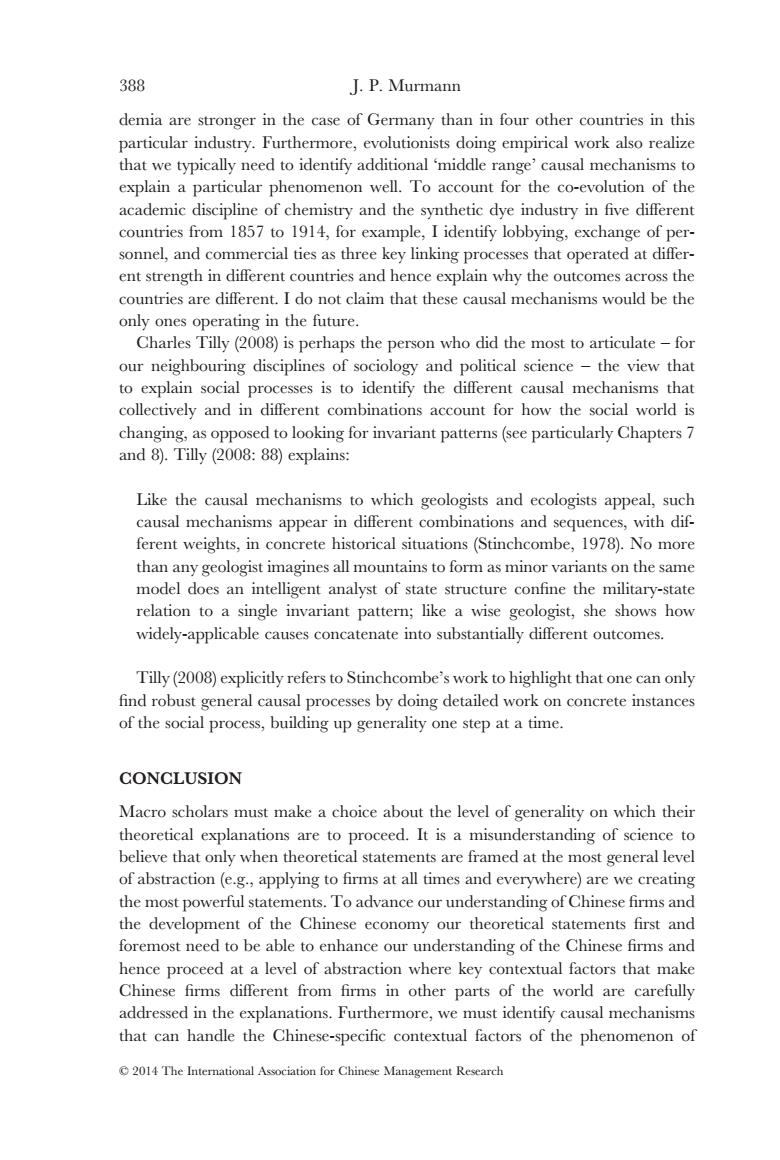正在加载图片...

388 J.P.Murmann demia are stronger in the case of Germany than in four other countries in this particular industry.Furthermore,evolutionists doing empirical work also realize that we typically need to identify additional 'middle range'causal mechanisms to explain a particular phenomenon well.To account for the co-evolution of the academic discipline of chemistry and the synthetic dye industry in five different countries from 1857 to 1914,for example,I identify lobbying,exchange of per- sonnel,and commercial ties as three key linking processes that operated at differ- ent strength in different countries and hence explain why the outcomes across the countries are different.I do not claim that these causal mechanisms would be the only ones operating in the future. Charles Tilly(2008)is perhaps the person who did the most to articulate-for our neighbouring disciplines of sociology and political science-the view that to explain social processes is to identify the different causal mechanisms that collectively and in different combinations account for how the social world is changing,as opposed to looking for invariant patterns(see particularly Chapters 7 and 8).Tilly (2008:88)explains: Like the causal mechanisms to which geologists and ecologists appeal,such causal mechanisms appear in different combinations and sequences,with dif- ferent weights,in concrete historical situations(Stinchcombe,1978).No more than any geologist imagines all mountains to form as minor variants on the same model does an intelligent analyst of state structure confine the military-state relation to a single invariant pattern;like a wise geologist,she shows how widely-applicable causes concatenate into substantially different outcomes. Tilly(2008)explicitly refers to Stinchcombe's work to highlight that one can only find robust general causal processes by doing detailed work on concrete instances of the social process,building up generality one step at a time. CONCLUSION Macro scholars must make a choice about the level of generality on which their theoretical explanations are to proceed.It is a misunderstanding of science to believe that only when theoretical statements are framed at the most general level of abstraction (e.g.,applying to firms at all times and everywhere)are we creating the most powerful statements.To advance our understanding of Chinese firms and the development of the Chinese economy our theoretical statements first and foremost need to be able to enhance our understanding of the Chinese firms and hence proceed at a level of abstraction where key contextual factors that make Chinese firms different from firms in other parts of the world are carefully addressed in the explanations.Furthermore,we must identify causal mechanisms that can handle the Chinese-specific contextual factors of the phenomenon of 2014 The International Association for Chinese Management Researchdemia are stronger in the case of Germany than in four other countries in this particular industry. Furthermore, evolutionists doing empirical work also realize that we typically need to identify additional ‘middle range’ causal mechanisms to explain a particular phenomenon well. To account for the co-evolution of the academic discipline of chemistry and the synthetic dye industry in five different countries from 1857 to 1914, for example, I identify lobbying, exchange of personnel, and commercial ties as three key linking processes that operated at different strength in different countries and hence explain why the outcomes across the countries are different. I do not claim that these causal mechanisms would be the only ones operating in the future. Charles Tilly (2008) is perhaps the person who did the most to articulate – for our neighbouring disciplines of sociology and political science – the view that to explain social processes is to identify the different causal mechanisms that collectively and in different combinations account for how the social world is changing, as opposed to looking for invariant patterns (see particularly Chapters 7 and 8). Tilly (2008: 88) explains: Like the causal mechanisms to which geologists and ecologists appeal, such causal mechanisms appear in different combinations and sequences, with different weights, in concrete historical situations (Stinchcombe, 1978). No more than any geologist imagines all mountains to form as minor variants on the same model does an intelligent analyst of state structure confine the military-state relation to a single invariant pattern; like a wise geologist, she shows how widely-applicable causes concatenate into substantially different outcomes. Tilly (2008) explicitly refers to Stinchcombe’s work to highlight that one can only find robust general causal processes by doing detailed work on concrete instances of the social process, building up generality one step at a time. CONCLUSION Macro scholars must make a choice about the level of generality on which their theoretical explanations are to proceed. It is a misunderstanding of science to believe that only when theoretical statements are framed at the most general level of abstraction (e.g., applying to firms at all times and everywhere) are we creating the most powerful statements. To advance our understanding of Chinese firms and the development of the Chinese economy our theoretical statements first and foremost need to be able to enhance our understanding of the Chinese firms and hence proceed at a level of abstraction where key contextual factors that make Chinese firms different from firms in other parts of the world are carefully addressed in the explanations. Furthermore, we must identify causal mechanisms that can handle the Chinese-specific contextual factors of the phenomenon of 388 J. P. Murmann © 2014 The International Association for Chinese Management Research